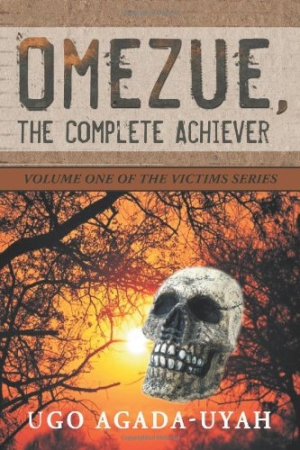Omezue, The Complete Achiever
Volume One of the Victims Series
Nigerian author brings a wealth of knowledge of African slave trade to this eye-opening story.
White slave traders posed a fearful threat to West African natives from 1450 and 1860. The events in this well-researched first volume of Ugo Agada-Uyah’s projected Victims series takes place in southeastern Nigeria, just as the slave trade ended.
Omezue: The Complete Achiever concerns a city-state whose inhabitants rely on innate intelligence and fighting prowess to avoid ambush from hostile neighboring tribes or abduction by slave traders. A male hierarchy governs the villagers democratically; an enlightened approach for Africans of that era. Their peaceful ways are challenged when Okoro, a wealthy slave merchant from Ako Kingdom, comes to establish residency there. A village warrior apprehends the intruder, recognizing Okoro’s aristocratic origins by his manner, dress, and physical features. The warrior’s instincts say to kill Okoro, but, aware of the deadly curse imposed upon his people by the all-powerful oracle of Ako Kingdom, and in obedience to the elders’ directive that all strangers be brought to them, he escorts Okoro to his village.
Upon Okoro’s arrival, village elders convene to consider his request for residence and quickly discern the ruthlessness behind his eyes. Okaomie, a direct descendant of the city-state’s founder and village spokesman, possesses a friendly but cautious demeanor that unnerves Okoro, who realizes that his plan to dominate the region may not be so easy. Okoro further observes, “They didn’t glance at each other, but there seemed to be another means of communication between them that eluded him.”
Having established a cautious but mutually respectful friendship, Okoro escorts Okaomie to Ako Kingdom where Okaomie receives permission from the oracle to try for the rank of Omezue, the Complete Achiever. The difficult initiation lasts seven lunar months and requires unwavering loyalty from his fellow tribesmen. If he achieves this high title, the oracle’s curse on his family will be purged.
Agada-Uyah lives in Nigeria and writes knowledgeably of the country’s culture and superstitions. The narrative presents an authoritative account of survival in the final years of the slave trade. The author’s understanding of that historical period informs both her descriptive narration and plot development. Written in omniscient point of view, the story involves numerous characters and interwoven plots. A helpful glossary of African words is included in the book.
Though Agada-Uyah’s writing shows competence in English, pieces of dialogue are awkward, such as “he grated out” or “he bit out.” Additionally, overlong conversations devolve into exposition, providing information but sacrificing realistic dialogue and interrupting dynamic plot flow. During the overnight stop in a safe village controlled by Kalu, Okaomie’s friend, Okoamie tells his men, “Ako traders provide Ogbuisi [their hosts] warriors legitimate wars to acquire human heads, while Ako traders loot the property of their victims and take captives to sell into slavery. It is a symbiotic relationship.” A number of errors in punctuation and word usage were also found.
Nevertheless, this authentic tale of peace-loving villagers battling against white slavers and their native conspirators offers readers an insightful look into an unfortunate era of human history.
Reviewed by
Margaret Cullison
Disclosure: This article is not an endorsement, but a review. The publisher of this book provided free copies of the book and paid a small fee to have their book reviewed by a professional reviewer. Foreword Reviews and Clarion Reviews make no guarantee that the publisher will receive a positive review. Foreword Magazine, Inc. is disclosing this in accordance with the Federal Trade Commission’s 16 CFR, Part 255.

